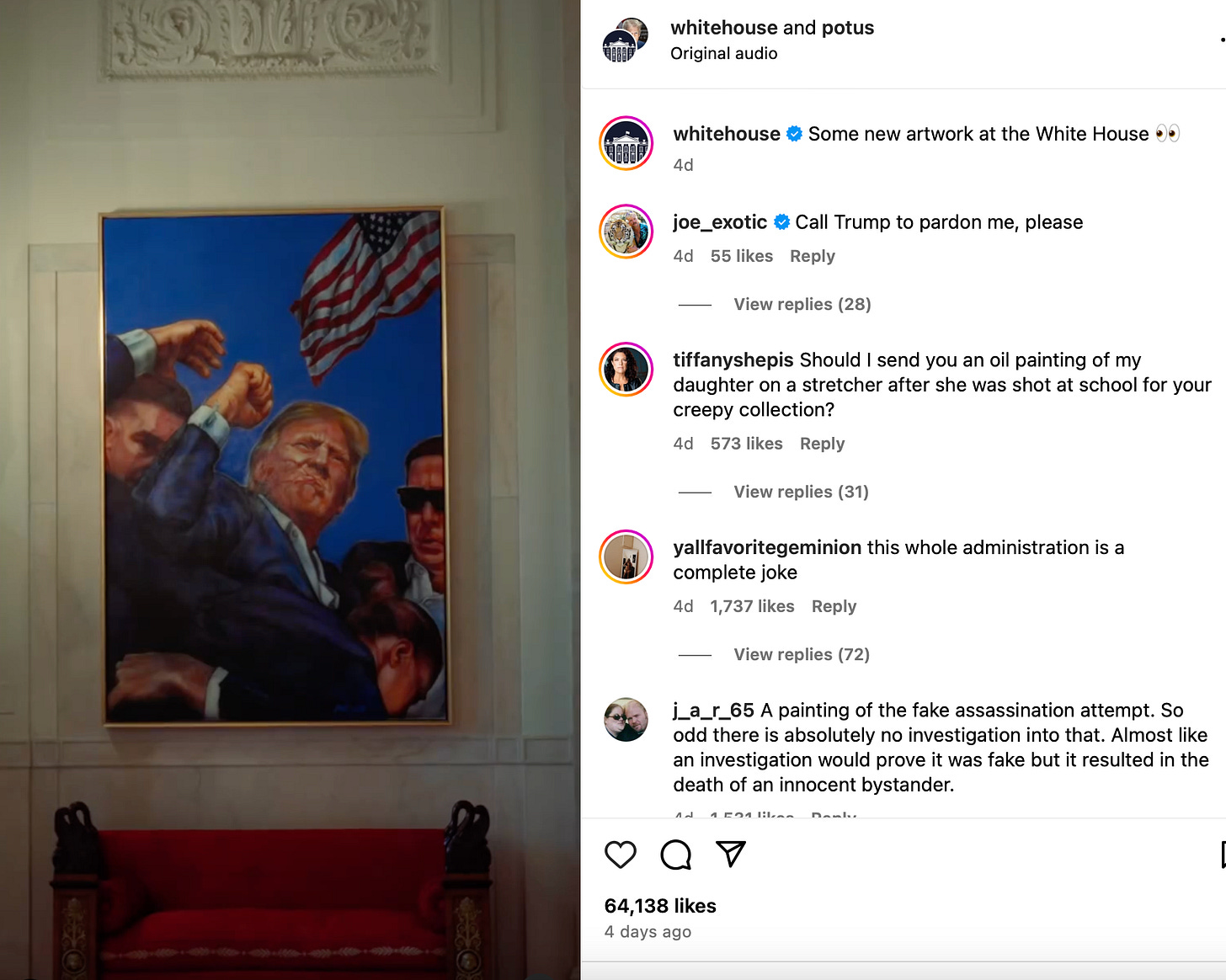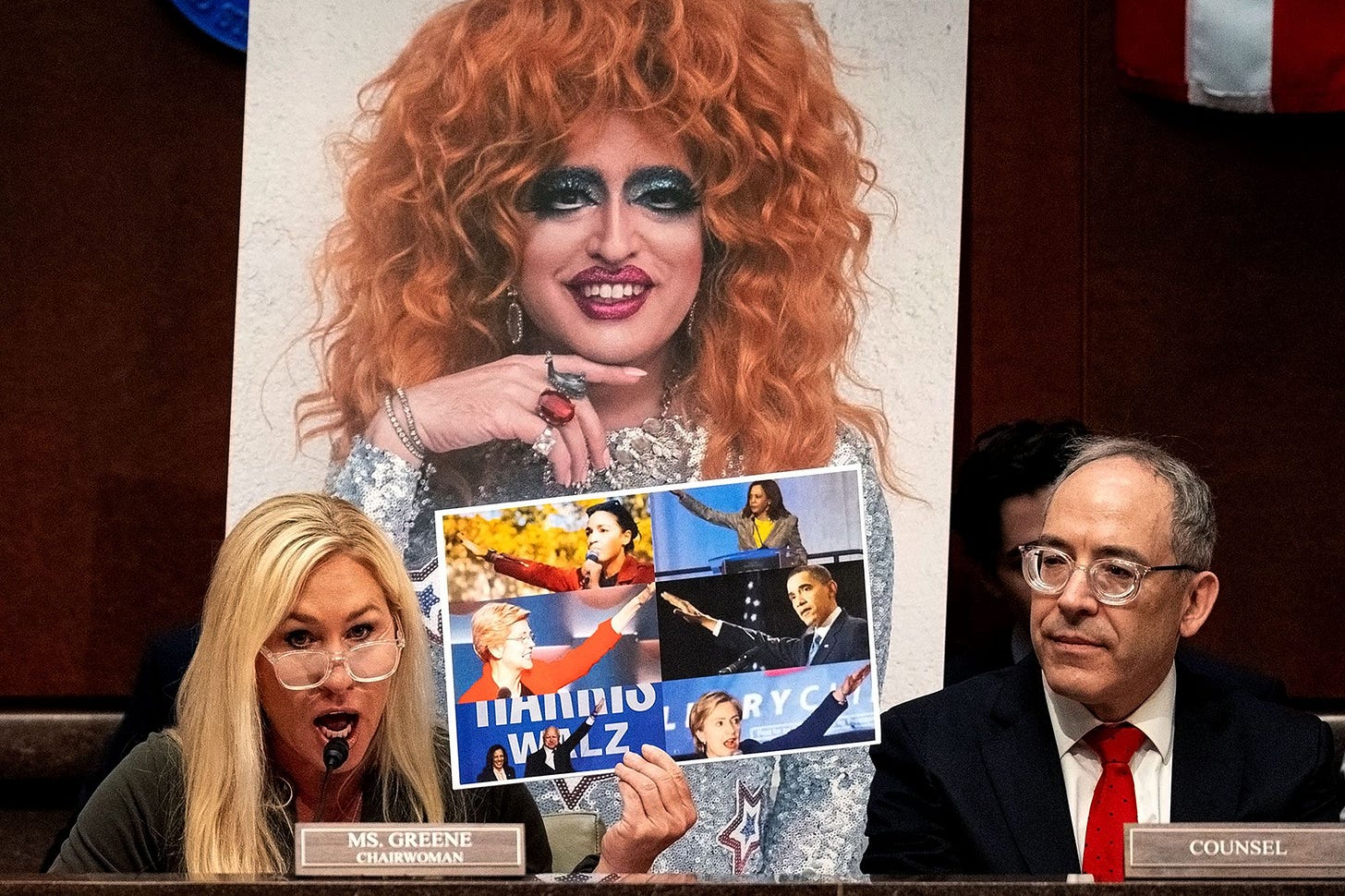The week in autocracy: March 23-April 16, 2025
Separating Signals and Noise with the help of Timothy Snyder’s “On Tyranny: Twenty Lessons from the Twentieth Century”
Hello again,
For those who are new to the party, this is my periodic, curated log of the early days of the Trump administration as seen through the analytical lens of Timothy Snyder's “On Tyranny” (plug: READ THIS BOOK, or better yet, listen to the audiobook for extra material on Russia and Ukraine).
What began as a personal effort to overcome the anxiety that accompanied the dizzying pace of events by trying to categorize them (and in the process, memorialize and understand them more fully) has now evolved into this “newsletter” and speculative sci-fi AI experiment. There is nothing here particularly brilliant or unique, but I do find it slightly therapeutic to sort through the garbage dumpster of current events and construct a kind of upcycled artifact that is both more disquieting and more reassuring than the daily news cycle.
Each newsletter will follow the same format: links to articles categorizing current events within Snyder’s 20 historical lessons, accompanied by a simple indicator: ⬆️ when democratic institutions are eroding, and ⬇️ when individuals or organizations successfully defend democratic norms. These are followed by an (AI-generated) entry in the fictional Encyclopedia of 21st Century Democracy. Perhaps I've been spending too much time with Ursula K. Le Guin, Philip K. Dick, and Liu Cixin lately, but I've found that viewing current events through this speculative lens offers a peculiar clarity.
There's something about imagining how future historians might contextualize our present chaos that helps identify what truly matters versus what's merely noise.
So here’s what’s happened since we last checked in…
More institutions are facing intense pressure, particularly higher education and law firms. Columbia University may be placed under a consent decree — not unlike the process undertaken by the Hungarian government to hollow out the Central European University in Budapest. Harvard stands as a notable exception, refusing to dismantle DEI programs despite risking $9 billion in federal funding. Law firms like Jenner & Block and WilmerHale are among the few firms that are refusing to cut a deal with the administration. To date, nine firms have committed to nearly $1 billion worth of pro bono legal work on behalf of the Trump White House.
A true constitutional crisis is brewing over the administration's defiance of court orders to return Maryland resident1 Kilmar Abrego Garcia, wrongfully deported to El Salvador. Snyder has called this "the beginning of an American policy of state terror." More disturbing still, Blackwater founder Erik Prince is pitching an extrajudicial extraterritorial mass deportation program to accelerate deportations of undocumented immigrants by transferring detainees to a high-security prison in El Salvador.
The suffocating weight of government power is being brought down on individuals like former CISA Director Christopher Krebs, who now has his own dedicated Executive Order investigating him for "falsely and baselessly denied that the 2020 election was rigged and stolen, including by inappropriately and categorically dismissing widespread election malfeasance and serious vulnerabilities with voting machines." It’s worth reading that excerpt again, in full:
Christopher Krebs, the former head of the Cybersecurity and Infrastructure Security Agency (CISA), is a significant bad-faith actor who weaponized and abused his Government authority. Krebs’ misconduct involved the censorship of disfavored speech implicating the 2020 election and COVID-19 pandemic. CISA, under Krebs’ leadership, suppressed conservative viewpoints under the guise of combatting supposed disinformation, and recruited and coerced major social media platforms to further its partisan mission. CISA covertly worked to blind the American public to the controversy surrounding Hunter Biden’s laptop. Krebs, through CISA, promoted the censorship of election information, including known risks associated with certain voting practices. Similarly, Krebs, through CISA, falsely and baselessly denied that the 2020 election was rigged and stolen, including by inappropriately and categorically dismissing widespread election malfeasance and serious vulnerabilities with voting machines. Krebs skewed the bona fide debate about COVID-19 by attempting to discredit widely shared views that ran contrary to CISA’s favored perspective.
Sigh. 😔
The systematic dismantling of crucial government functions continues: the DOJ's Public Integrity Section has been cut from 30 prosecutors to approximately five; CISA is under attack; IRS leadership has seen its third change this year amid turmoil; and the ATF now has an unusual appointment with Army Secretary Dan Driscoll taking over. Additionally, 60 universities face antisemitism investigations, and 600 international students have had visas summarily revoked, often without notice or explanation. As Meta ends fact-checking, Russia's state-run TASS announces it will begin fact-checking, and Alexander Dugin, the proudly fascist philosopher nicknamed "Putin's Brain," gains platforms among right-wing influencers.
The administration's immigration rhetoric entered even more Orwellian territory: "due process looks different," and we need an "Amazon-like" mass deportation system were stands outs. Homeland Security Secretary Kristi Noem staged propaganda photos at El Salvador's CECOT mega-prison while cynically claiming to fight antisemitism. More expansive surveillance tools were rolled out to catch and monitor potential illegal immigrants.
Some brave voices have stood firm: Harvard; Jenner & Block; WilmerHale; the Jewish Council for Public Affairs; education officials in California, Illinois and Maine; Senators Cory Booker, Chris Murphy, Brian Schatz and Sheldon Whitehouse; Maine Governor Janet Mills; former Special Envoy Lipstadt; Berkeley Law Dean Erwin Chemerinsky; and Atlantic Editor Goldberg—alongside the 3 million-plus "Hands Off!" protesters in all 50 states. And, hot of the presses, Sen. Chris Van Hollen landed yesterday in San Salvador to help secure the return of Abrego Garcia. U.S. District Judge Paula Xinis is pushing for answers on what happened to Garcia, and what efforts have been made by the Trump administration to bring him back to America, stating at a court hearing: “To date, what the record shows is that nothing has been done. Nothing.” Federal judge James Boasberg indicated that there was probable cause to find Trump administration officials in criminal contempt of court for refusing to obey his order to cease deportations under the Alien Enemies Act. Quite the cliffhanger…
Some of the most compelling pieces are profiles and interviews with individuals fighting against autocracy in Brazil, fleeing autocracy in Turkey, recovering from autocracy in Poland, and warning about autocracy from Hungary. We have a lot to learn from these countries and their Cassandras.
It's telling that Timothy Snyder—who inspired this newsletter—has relocated to the University of Toronto alongside his wife Marci Shore and another scholar of fascism Jason Stanley. "I'm both a Jew and a historian of the 1930s, so the neurotic catastrophism is perhaps overdetermined: it's always been clear to me that the lesson of 1933 is that it's better to get out sooner rather than later," Shore told TorontoToday. And Levitsky and Ziblatt, authors of "How Democracies Die," now state: the U.S. is no longer merely backsliding—we face an active "democratic emergency."
The twenty lessons from “On Tyranny” follow…
1. Do not obey in advance - Anticipatory obedience empowers authoritarians before they fully take control
⬆️⬇️ The New York Times: Harvard Rejects Trump Administration's Demands Over Federal Funding
⬆️⬇️ Politico: Two more law firms targeted by Trump sue to block punishing executive orders
⬇️ Washington Post: Law firms refuse to represent Trump opponents in the wake of his attacks
⬇️ Washington Post: Trump is targeting law firms and academia. Why don’t they speak up?
2. Defend institutions - They help preserve democracy and need active protection
⬇️ POLITICO: El Salvador President Refuses to Return Wrongly Deported Maryland Man
⬇️ The Bulwark: Bukele, Abrego Garcia, and Red Lines
⬇️ Timothy Snyder Substack: State Terror – A brief guide for Americans
⬇️ The Wall Street Journal: Trump Administration Wants to Install Federal Oversight of Columbia University
⬇️ The New York Times: Trump Is Going After Universities' Federal Funding. Here's What to Know
⬇️ Reuters: Trump targets lawyers in immigration cases, lawsuits against administration
⬆️ Press Release: Senator Sheldon Whitehouse: Whitehouse Demands Answers from Justice Department on Dismantling of Public Integrity Section
⬇️ USA Today: Acting IRS Chief to Depart, Extending Turmoil at Agency
⬇️ Associated Press: IRS agrees to send immigrant tax data to ICE for enforcement
3. Beware the one-party state - Support multiparty systems and democratic processes
⬇️ WhiteHouse.Gov Executive Order: Addressing Risks from Chris Krebs and Government Censorship:
⬇️ CNN: Trump administration's election security measures raise concerns among experts
4. Take responsibility for the face of the world - Notice symbols of hate and remove them
⬇️ Mediaite: Trump Boots Obama's Portrait From Prominent White House Spot – Replaces It With Assassination Attempt Photo
5. Remember professional ethics - Maintain professional standards despite political pressure
⬇️ The New York Times: Justice Department's prosecution of Signal leak raises ethical questions
⬇️ The New York Times: Justice Department defends Trump policies amid internal dissent
6. Be wary of paramilitaries - Groups with weapons outside official structures threaten stability
⬇️ The New York Times: Trump Administration Moves to Roll Back Gun Control Measures
⬇️ POLITICO: Military contractors pitch unprecedented prison plan for detained immigrants
⬇️ New York Times: Under Trump, Gun Agency Remains Rudderless and Leaderless
7. Be reflective if you must be armed - Understand the responsibility if you are in law enforcement
⬇️ The New York Times: Tufts Doctoral Student Detained in Immigration Crackdown
⬇️ NBC News: Trump Administration Targets Immigrant Students in New Policy Shift
⬇️ Axios: Trump Administration Prefers Louisiana Courts for Immigration Cases
⬇️ Michigan Advance: ICE Director Envisions 'Amazon-Like' Mass Deportation System
⬇️ Associated Press: Florida universities to deputize campus police for immigration enforcement
⬇️ Inside Higher Ed: Trump Admin Broadens Scope of Student Visa Terminations
⬇️ NPR: Attorney representing a student protester detained by federal immigration agents
⬇️ NPR: 'Due process does look different': DHS official defends deportation of Maryland man
⬇️ Vox: How worried should legal immigrants be about Trump’s deportations?
8. Stand out - Someone has to set an example of courage
⬆️ Los Angeles Times: California signals possible defiance of Trump anti-DEI order that threatens school funding
⬆️ Axios: Illinois defies federal funding threats over DEI
⬆️ The New York Times: Trump and Maine’s Governor Clash Over Transgender Athlete Policy
⬆️ The New York Times: Trump’s Immigration Policies Stir Debate Among Conservatives
⬆️ LinkedIn: Wayne Ting on CEOs' Concerns Over DEI Program Cuts
9. Be kind to our language - Maintain clear communication; resist propaganda and meaningless phrases
⬇️ Axios: Noem sends warning to immigrants as she tours El Salvador prison
⬇️ Fox News: Gun-toting Noem joins ICE agents to go after criminal illegal aliens in Arizona
⬇️ The New York Times: Trump’s Executive Order Aims to Reshape Smithsonian Exhibits
⬇️ Politico: State tells employees to report on one another for 'anti-Christian bias'
10. Believe in truth - Seek and defend factual reality
⬇️ PJ Media: Here's What the Media Won't Tell You About the Atlantic Hit Piece
⬇️ WND: On Security Breaches and the Nothing-Burger Signal Chat
⬇️ Washington Post: Trump’s D.C. U.S. attorney pick appeared on Russian state media over 150 times
⬆️ The Wall Street Journal: Steve Witkoff Takes the Kremlin’s Side
⬇️ Fox Business: Meta Announces It Will Officially End Fact-Checking Across Its U.S. Platforms
⬇️ NewsGuard Reality Check: Commentary: The Truth About Russia’s New ‘Global Fact-Checking Network’
⬇️ The Wall Street Journal: Meet the Russian Dubbed ‘Putin’s Brain’ Who Is Courting Trump Supporters
11. Investigate - Read beyond your comfort zone; learn from varied sources
⬇️ The Hill: Trump calls for defunding NPR, PBS
12. Make eye contact and small talk - Create the social bonds that sustain democracy
⬇️ The Atlantic: Trump’s Anti-Semitism Agenda Isn’t About Jews
⬇️ The New York Times: Opinion | Trump’s Cynical Use of Anti-Semitism
⬆️ Jewish Insider: Lipstadt says Trump admin ‘weaponized’ antisemitism in higher ed policy
⬆️ Press Release: Statement Rejecting False Choice Between Jewish Safety & Democracy
13. Practice corporeal politics - Protect your body and advocate for others' physical needs
⬆️ BBC News: Anti-Trump protests held in cities across the US
14. Establish a private life - Defend your privacy and personal data
The Hill: Federal judge blocks Musk's DOGE from accessing Treasury data
⬇️ The New York Times: Trump Administration Leverages Technology and Private Firms in Immigration Crackdown
⬇️ 404 Media: Inside a Powerful Database ICE Uses to Identify and Deport People
15. Contribute to good causes - Support civil society organizations
⬇️ International Bar Association: Fighting American Autocracy
⬇️ Inside Philanthropy: How We Got Here: Six Reasons Liberal Philanthropy Is Losing the Battle for America's Future
16. Learn from peers in other countries - Connect with people facing similar struggles elsewhere
🇧🇷 The New Yorker: The Brazilian Judge Taking On the Digital Far Right
🇭🇺 The Context (podcast): Gábor Scheiring: Saving Democracy Is about Saving People
🇵🇱 The New York Times: Poland Shows How Quickly Democracy Can Erode
🇨🇦 The Free Press: Meet the Albertan Separatists Who Want to Be American
🚨 Foreign Affairs: How to Save a Democracy
🇭🇺 The Atlantic: America’s Future Is Hungary
🇹🇷 The Lede (podcast): How To Lose a Country: The Limits of Democracy
17. Listen for dangerous words - Be alert to rhetoric that signals tyrannical intent
⬇️ USA Today: President Trump labels judges as 'traitors' in sedition crackdown
⬇️ Tweet: House Foreign Affairs Committee Majority: MAGA 1, Libs 0
18. Be calm when the unthinkable arrives - Maintain composure in crisis
🤷
19. Be a patriot - Love your country in a meaningful way that upholds its best values
🤷
20. Be as courageous as you can - Ordinary individual choices can change history
⬆️ Politico: A College President Gets Real About Trump’s Attack on Universities
⬆️ The 19th News: What Cory Booker spoke about for 25 hours: the programs holding America together
⬆️ Axios: Scoop: Schatz expands holds to more than 300 Trump nominees
⬆️ The New Yorker Radio Hour: Senator Chris Murphy: “This Is How Democracy Dies—Everybody Just Gets Scared”
And as a digestif, some additional disturbing articles that clearly demonstrate a draft away from democratic fundamentals, but don’t fit neatly into Snyder’s criteria:
🇨🇦 Toronto Today: University of Toronto hires three prominent Yale professors worried about Trump
🧬 The New York Times: America Is Losing Its Young Scientists
🇺🇸 The Washington Post: What America could look like a decade from now
And now, the future:
From the Encyclopedia of 21st Century Democracy (Entry for March 23-April 16)
The spring of 2025 marked a decisive period in America’s democracy, marked by further weakening of institutions, manipulation of language, and normalization of previously unacceptable behaviors.
Universities as Contested Terrain
Higher education institutions became central battlegrounds in the broader conflict over democratic values. Harvard University's public rejection of the Trump administration's demands to implement sweeping reforms aimed at curbing alleged antisemitism represented a significant moment of institutional resistance. Despite threats of losing approximately $9 billion in federal funding, Harvard President Alan Garber emphasized the university's commitment to academic freedom, stating, "No government—regardless of which party is in power—should dictate what private universities can teach, whom they can admit and hire, and which areas of study and inquiry they can pursue."
This stance stood in stark contrast to Columbia University's decision to comply with similar demands to preserve $400 million in federal grants. The administration sought to place Columbia under a consent decree—an unprecedented legal arrangement in higher education that would subject the institution to federal oversight with a judge monitoring compliance. These developments reflected a broader effort to exert governmental control over historically independent institutions.
"No government—regardless of which party is in power—should dictate what private universities can teach, whom they can admit and hire, and which areas of study and inquiry they can pursue."
The Strategic Targeting of Law Firms
The legal profession faced unprecedented pressures designed to undermine its independence. President Trump issued a memorandum directing the Department of Justice to pursue sanctions against attorneys involved in immigration lawsuits and other legal actions against the government. The directive accused certain lawyers of facilitating "rampant fraud and meritless claims" in the immigration system and instructed the DOJ to refer firms engaged in "baseless partisan" lawsuits for potential revocation of security clearances and termination of federal contracts.
Two prominent law firms, Jenner & Block and WilmerHale, filed lawsuits challenging executive orders that excluded them from government contracts and revoked key lawyers' security clearances. Jenner & Block's lawsuit emphasized that the orders aimed to "punish citizens and lawyers based on the clients they represent, the positions they advocate, the opinions they voice, and the people with whom they associate."
The impact of these actions created a "chilling effect," with many firms unwilling to represent individuals or entities opposing the administration for fear of retribution.
The targeting of law firms represented a deliberate strategy to weaken institutional resistance to executive power. By making legal representation unavailable or risky for government opponents, the administration effectively limited checks on its authority—a tactic previously observed in countries experiencing democratic backsliding.
Strategic Dismantling of Oversight Mechanisms
Multiple governmental institutions designed to maintain accountability were systematically weakened or repurposed, including the Department of Justice's Public Integrity Section, which investigates corruption by government officials, and the IRS. Acting IRS Commissioner Melanie Krause announcing her resignation following the implementation of a controversial data-sharing agreement between the IRS and Immigration and Customs Enforcement, allowing ICE access to taxpayer address information. This agreement represented a significant departure from longstanding policies separating tax and immigration enforcement, raising privacy concerns and potentially undermining voluntary tax compliance among immigrant communities.
The administration's election security measures also raised concerns among cybersecurity experts and civil rights advocates. New requirements included mandatory proof of citizenship for voter registration and stipulations that all ballots be received by Election Day, which critics argued could disenfranchise legitimate voters, particularly those without immediate access to citizenship documentation.
Immigration Enforcement as Political Weapon
During this period, immigration enforcement emerged as a powerful tool for political control and messaging. The administration's approach was exemplified by the case of Kilmar Abrego Garcia, a Maryland resident deported to El Salvador despite a court order. When questioned about this action, a Department of Homeland Security official stated that "due process does look different" for individuals associated with designated terrorist organizations—a concerning redefinition of constitutional protections.
Homeland Security Secretary Kristi Noem visited El Salvador's CECOT mega-prison, where 238 Venezuelans deported by the Trump administration under allegations of gang membership were being held. The deportations defied a court order, creating a legal battle that tested the limits of judicial oversight of executive actions.
The administration also explored a partnership with private military contractors for immigrant detention. Erik Prince, founder of Blackwater, proposed transferring detainees from U.S. immigration facilities to a high-security prison in El Salvador, with a section designated as U.S. territory to allow American legal jurisdiction. This unprecedented proposal would have effectively created an extraterritorial detention system outside normal legal constraints.
The targeting of immigrant students became particularly pronounced, with over 600 international students and recent graduates had their visas revoked across more than 100 colleges and universities. The policy disproportionately affected students involved in pro-Palestinian activism, though individuals with minor infractions such as traffic violations were also targeted.
News reports revealed the existence of a vast surveillance database called Investigative Case Management (ICM), used by Immigration and Customs Enforcement. This centralized system allowed agents to filter individuals based on hundreds of highly specific data points, including visa status, physical characteristics, country of origin, social security numbers, bankruptcy filings, race, and place of employment. The database incorporated information from real-time license plate reader data, location maps, and other databases operated by DHS and additional federal agencies, creating an unprecedented capability to track and target individuals. ICM could construct queries to identify "people who are on a specific type of visa who came into the country at a specific port of entry, who came from a specific country, and who have a specific hair color."
Media Control and Information Manipulation
The period witnessed systematic efforts to control information flows and reshape public discourse. President Trump renewed calls to defund National Public Radio and the Public Broadcasting Service, criticizing them as biased against conservatives. This aligned with broader efforts to reduce federal support for media organizations perceived as unfavorable to the administration.
Meta announced the termination of its third-party fact-checking program on U.S. platforms, including Facebook and Instagram. The company planned to replace it with a "Community Notes" system allowing users to add context to posts. Critics warned that eliminating professional fact-checking could lead to increased misinformation, especially as Russia launched its own "Global Fact-Checking Network" (GFCN), which analysts described as a strategic move to erode trust in legitimate verification efforts.
The administration also targeted cultural institutions. President Trump signed Executive Order 14253, titled "Restoring Truth and Sanity to American History," directing the Smithsonian Institution to remove exhibits deemed as promoting "improper ideology." The order mandated the restoration of monuments that had been altered or removed since 2020 and called for the elimination of content that "inappropriately disparage Americans past or living."
Institutional Resistance and Civic Courage
Despite these concerning developments, significant resistance emerged from various institutions and individuals. California and Illinois officials signaled defiance against federal directives threatening to withhold education funding from states that maintained Diversity, Equity, and Inclusion programs. Illinois officials argued that their DEI efforts complied with federal and state law, even as the administration issued a 10-day ultimatum for states to certify alignment with a reinterpreted version of Title VI of the Civil Rights Act.
Wesleyan University President Michael Roth publicly criticized the administration's suppression of academic freedom and student activism, emphasizing the importance of universities standing firm against political pressures that threatened their autonomy. Such public statements from academic leaders remained relatively rare, making Roth's stance particularly notable.
Senator Cory Booker delivered a historic 25-hour speech on the Senate floor, protesting the administration's policies that he argued threatened American social infrastructure. Booker addressed proposed cuts to public education, Social Security, and Medicaid, as well as attempts to dismantle the Department of Education and suppress dissent. Similarly, Senator Brian Schatz placed holds on over 300 of President Trump's nominees, including key positions across various federal agencies, as a protest strategy against administration actions.
In the philanthropic sector, Howard G. Buffett, son of billionaire investor Warren Buffett, pledged to donate $1 billion in aid to Ukraine through his foundation, effectively stepping in where official U.S. policy had retreated. This represented a significant example of private civil society attempting to maintain international commitments despite shifts in government policy.
Conclusion: A Historical Inflection Point
The spring of 2025 represented what Senator Chris Murphy described as a moment when "democracy dies—everybody just gets scared." The period demonstrated the vulnerability of democratic institutions to coordinated pressure across multiple domains, revealing how quickly established norms could erode when challenged simultaneously.
What distinguished this period was not any single action but the systematic nature of the assault on democratic institutions—from universities to courts, from regulatory agencies to media organizations. The experience validated Snyder's warning that tyranny emerges not through dramatic rupture but through the gradual normalization of previously unacceptable behavior.
The period also revealed both the fragility and resilience of democratic institutions. While many individuals and organizations yielded to pressure, others maintained their independence at significant personal and financial risk. These acts of resistance—whether from universities, senators, philanthropists, or individual citizens—served as crucial counterpoints to democratic erosion.
🚨🚨🚨
Or, as Stephen Miller describes him: “He is not a ‘Maryland man’. He is not a ‘Maryland’ anything. He is an illegal alien from El Salvador with a deportation order from the United States. … And if the entire Democrat Party wants to work itself into a state of emotional hysteria to demand the return of illegal gang members and terrorists to our shores, then that 21 percent [level of public support] will soon be 15, and then it’ll be 11…”











